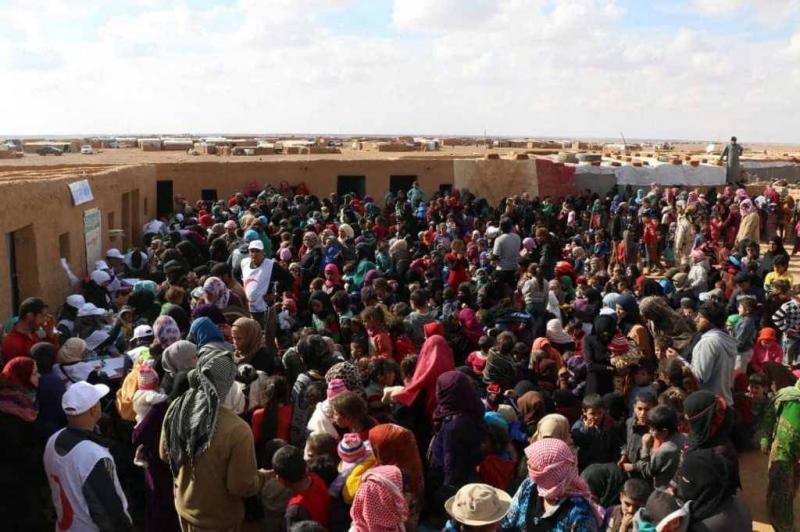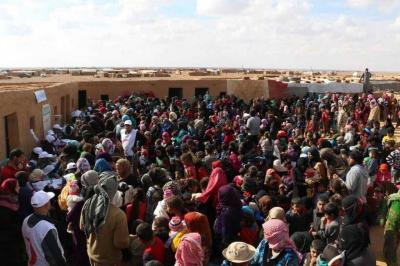In a geographical area located at the border triangle between Jordan, Iraq, and Syria, thousands of civilians reside in a camp known as "Rukban." For more than two years, no humanitarian aid has entered for them. They are forgotten, unnoticed by anyone, surrounded on all sides, which serendipitously kept the "Corona" virus from entering their community since the pandemic began. These individuals live in extremely tragic conditions, according to Ahmed Khalidi, the head of the local council for "Rukban," who stated in an interview with "Al Hurra": "The situation of civilians, who number over 10,000, is dire. The camp is surrounded on all sides: from the south (Jordan), from the east (Iraq), and to the north and west, there is the Syrian regime and Iranian militias."
Three days ago, the camp's name was unexpectedly mentioned when five “empty” trucks belonging to the United Nations entered to transport families wishing to leave to areas controlled by the Syrian regime. Despite families refusing to leave, this will not prevent further attempts, according to Khalidi, who clarifies that they recently received a letter from the "OCHA" office in Damascus, notifying them that the latter has commenced a "relief mission" to support voluntary departures of residents over the next three months. Khalidi, who resides in Rukban, added: "The terms of the letter are clear. There are no guarantees for any individual wanting to leave to areas controlled by the Syrian regime. Nonetheless, there are people wanting to escape from death to another death, due to hunger and various diseases."
In the letter, which "Al Hurra" has reviewed a copy of, the United Nations stated that with the assistance of the "Syrian Arab Red Crescent," they would support the "voluntary" departure process for those who expressed readiness to leave the Rukban camp to the areas of their choosing, via a shelter in Homs, after undergoing a health quarantine. The letter also mentioned that "the United Nations is doing everything it can to complete this mission as soon as possible. Departures will occur in batches over a period of three months," providing details about the evacuation process and the mechanism that will operate over the next three months.
Concerning guarantees to ensure the safety of those wishing to leave the camp, the United Nations indicated in its letter that "the responsibility for the safety and security of individuals lies with the controlling parties and the government of the Syrian Arab Republic." After families leave the camp, they will be transferred to shelters in Homs, and they will need to obtain approval from the authorities to choose their subsequent destination.
The Rukban camp falls within the 55-kilometer zone controlled by the "Revolution Command Army" with the support of an international coalition. Over the past months, there have been notable calls and statements from Russian officials regarding the dismantling of the "Rukban camp." Among those calls, Mikhail Mizintsev, head of the National Defense Management Center of the Russian Defense Ministry, stated that a new process for evacuating displaced persons from Rukban has been developed, referring to its location on the Syrian-Jordanian border. He added last June: "The Syrian government has prepared temporary accommodation centers for those who wish to leave the camp," indicating that the details for evacuating civilians have already been agreed upon, with the United Nations ready to provide transportation.
On the other hand, Abdul Razak Khadr Al-Muhya, the director of the media office for the "Revolution Command Army," stated: "As for the commandos, they had no role other than to protect the vehicles and facilitate their passage to the camp's gate." In an interview with "Al Hurra," he added: "The trucks that entered recently left empty after the drivers were assaulted by individuals within the Rukban camp."
Since March 2020, Jordan closed the only medical point that provided first aid and handled critical childbirth cases, also sealing the border as part of measures to curb the spread of the COVID-19 virus. Despite appeals to allow some emergency cases after closing the medical point, camp officials received no response from Jordanian authorities. A week ago, a young man, Saud Sobhi, a 37-year-old student, died as a result of an appendicitis explosion, according to diagnoses made by nurses at the Sham Medical Center located in the camp. Khalidi elaborated: “Today, there is no medical staff in the camp after the Jordanian Kingdom closed the only medical point on the border.” He added that the people of "Rukban" have not received any humanitarian assistance for over two years while they remain under complete siege, stating: "We are in a barren desert. There are no crossings, agriculture, or trade. The entire area surrounds us, and the situation is getting worse."
The camp, established in 2014, mainly houses residents from the countryside of Raqqa, Deir ez-Zor, Homs, and Hama. While accurate numbers regarding the population of the camp are absent, Khalidi mentions that they exceed ten thousand. Meanwhile, media activist Hamoud Abdullah reported isolated exits from the camp towards areas controlled by the Syrian regime. He explained in an interview with "Al Hurra": "A week ago, 40 individuals left due to the hardships of life and the lack of resources. Families are compelled to do so, as they have no options."
Simultaneously, as the UN began facilitating the transfer of families to areas controlled by the Syrian regime, "Amnesty International" issued a report warning of the implications of this process. The report stated that "the United Nations plans to facilitate the transfer of individuals from Rukban to shelters in Homs, where they will be subjected to a 14-day quarantine." It is unclear how many individuals will be transferred from Rukban in the upcoming stage if the UN-led repatriation process continues. "Amnesty International" urged the UN and the Syrian Arab Red Crescent not to proceed with these repatriation operations, which would undoubtedly endanger the lives of women, men, and children living in Rukban. Mary Forester, a researcher on refugees and migrants within the organization, noted that "our research indicates that the Syrian authorities specifically targeted returnees from Rukban, accusing them of terrorism before subjecting them to grave human rights violations."
Journalist Mohammed Hassan Al-Ayad reported that the movements regarding the transfer of families followed a significant tightening on "smuggling routes" that had previously crossed into Rukban and the 55-kilometer zone. Al-Ayad mentioned in an interview with "Al Hurra": "The routes that were used for the passage of food and medical supplies have unfortunately been completely closed recently." The Syrian journalist reported cases of arrest carried out by Syrian regime forces against individuals who had reached their areas after coming from the camp in recent months. Among the detainees is Muayad Obeid, considered a notable figure from the city of Qaryatayn, and the journalist referenced: "After he underwent reconciliation procedures, he was arrested, and his fate has remained unknown for more than a year and a half." Al-Ayad added: "Recently, around 40 individuals exited to areas controlled by the Syrian regime in the oasis of Al-Sawana in eastern Homs. Those who are transferred undergo security vetting and other arrangements that may ultimately lead to arrest."




